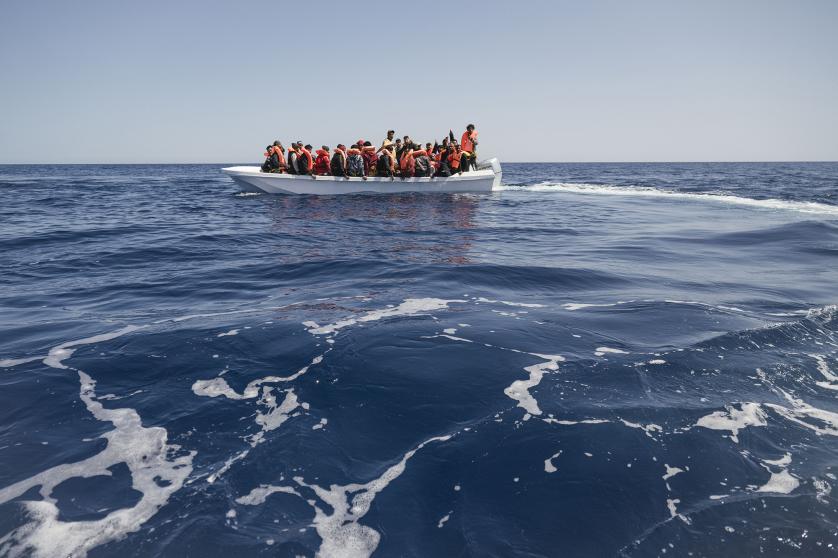EU migration policy not good enough

Special migration summit should unblock crucial reforms in light of major influx of migrants
Europe is currently sleepwalking into the next migration crisis. Last year alone, at least 330,000 illegal migrants arrived in Europe - that's over 60 percent more than in 2021 and more than at any time since 2015 and 2016. These numbers are unacceptable and show that existing European migration policies have failed. A recent survey by Eurobarometer measured that 70% of Europeans are worried about the impact of migration on their lives. The special migration summit is a crucial opportunity to revive a broken migration agenda.
We are concerned with two central pillars: First, we need strong protection of our external borders. We need a fully operational and strengthened border and coast guard (Frontex). The state, not the mafia, decides who comes to Europe and who does not. If we want to maintain free movement inside the EU, then people must know that the external borders are protected.
In our view, this also means building fences wherever this may be necessary. When dictator Lukashenko started using migrants to attack Europe as part of Russia’s hybrid war, the European Commission refused to finance this with EU funds. It is simply a reality of border protection that if we want to control who comes into the EU, we need infrastructure. Refusing European funds for this is a mistake.
At the same time, we must finally succeed in returning people who do not have a right to stay. More than half of the people who arrive will never receive a formal asylum status in Europe, and that is especially true for those travelling via southern routes. Their only option is illegality. This is inhumane and unacceptable. The European Commission has not made any progress on this in the last years. This is simply not good enough.
Just like the situation around search and rescue operations is not good enough. It is not sustainable that we leave it to NGOs to patrol the southern sea border. Civil society involvement is welcome, but we need a clear rulebook, defined by the EU. That is why we call for a code of conduct for NGOs performing search and rescue missions.
The second pillar, in addition to decisiveness at the border, is European solidarity and help for those who need protection. With refugees from Ukraine, Europe has proved it is capable and willing to show massive solidarity. Millions of Europeans generously offered help to the people from Ukraine with food and shelter, money and generators. If people know the external border is guarded, people are willing to help those in need.
The migration crisis is a common European challenge that we must shoulder together. Reception capacities in north western Europe are overflowing and with spring coming, arrivals in the south will reach even higher levels. With the threat from Russia and Turkey to weaponise migrants to disrupt the EU, it is clear nobody can look away anymore.
We need a long-term problem-solving strategy instead of a permanent spiral of indignation. Instead of escalation, like France did when it took in a single refugee boat with 234 people on board, we should focus on solidarity and not lose sight of the big picture. By comparison, Italy saw over 100,000 migrants arrive across the Mediterranean last year alone.
Germany and France promised Italy that they would take over 7,000 migrants as part of the voluntary solidarity mechanism. Have they delivered? Not at all! Only 202 people from Italy were relocated to Germany and France under this mechanism. We need more than solidarity on paper from Paris and Berlin.
Lastly, we need to reconsider how Europe can prevent people from making the hazardous crossing in the first place. There is a big role to play for economic development policy and international trade. However, the simple fact will remain that people want to come to Europe. That is why we believe the old idea of registration and reception centres outside European territory should be revived. As many people as possible should know what their perspectives are before they risk their lives.
We stand by the fundamental right of asylum, which is a defining principle in our relationship with the rest of the world. We are a continent of freedom and solidarity. At the same time, the scale and complexity of migration has radically changed. Europe has yet to adapt to this new reality. That is what needs to be done at the special summit on the 9th and 10th of February.
Note to editors
The EPP Group is the largest political group in the European Parliament with 176 Members from all EU Member States
MEP Contacts

Press contacts

Press officer for Legal and Home Affairs, Civil Liberties, Justice, Constitutional Affairs and for Sweden

Press officer for Foreign Affairs and for Greece
Other related content
6 / 54





